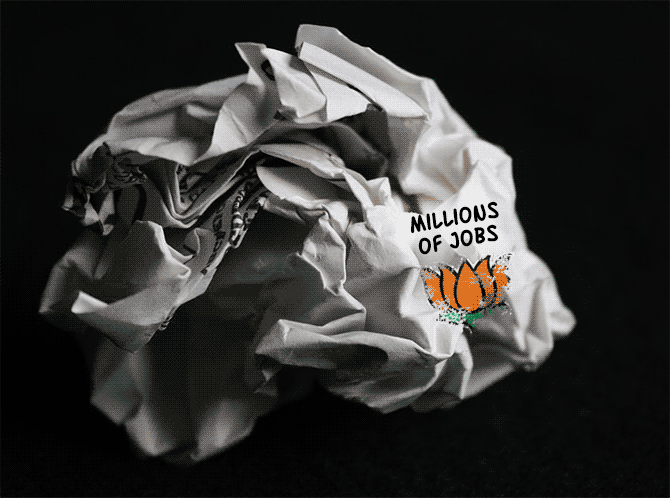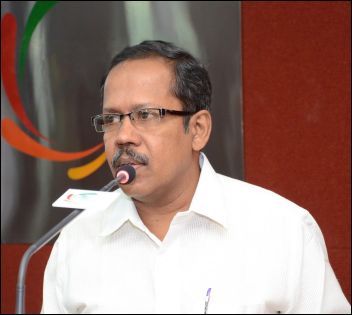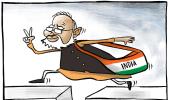'The government is sincerely working on employment generation. Unfortunately, they are depending on these people from Harvard. Their wrong policies are killing jobs. The government has to come out of the Western framework on which they depend upon a lot.'
Illustration: Dominic Xavier/Rediff.com

The Bharatiya Mazdoor Sangh (BMS), a trade union affiliated to the Rashtriya Swayamsevak Sangh, is miffed.
Reason: India's economy is slowing down, growth is in reverse gear and people are fearful about losing jobs.
The BMS passed a resolution after the conclusion of its three-day national executive recently, blaming the NITI Ayog and its Harvard influence over policy-makers.
In this interview with Rediff.com's Shobha Warrier, Saji Narayanan, president, BMS, below, expresses his strong views on the economy, the policies of NITI Ayog and the government.
"What is needed is increasing the purchasing power of the common man by increasing the wages," he says.
The Indian economy right now is going through a tough phase with several sectors doing badly. Auto industry that contributes 49 per cent of manufacturing output is the worst hit and it is said that lakhs of jobs will be lost. How worrying is the situation?
That’s why the BMS passed a resolution in the recent executive committee meeting in Delhi strongly criticising NITI Ayog for this situation.
Why criticise NITI Ayog and not the government?
Because NITI Ayog is the highest policy making body which is shaping the destiny of the nation.
Their views, the concepts and model they depend on are flawed.
In our meeting, we pointed out that what we are facing now is one of the biggest crises the country has ever faced.
Even in the Economic Survey report of 2012-13, this impending crisis was identified.
After our criticism, NITI Ayog chairman Rajiv Kumar responded by saying that the crisis was still continuing.
What he said was, there was no change in the situation that was mentioned in the 2012-13 survey.
So, the question arises, what has been the role of NITI Ayog?
What he said was, there is no easy answer to the complex situation.
From his response, you will understand the dimension of the issue that is in front of the nation and the confusing nature of NITI Ayog.
Does BMS also feel there is no easy answer to this complex situation?
Absolutely not. There are answers to all the problems.
It is NITI Ayog, the highest policy-making body, that says there is no easy answer to this complex situation.
What does it mean? The highest policy making body is in darkness while taking decisions. This, we feel is an alarming situation.
Secondly, he has accused the government of creating this situation.
He said it was because of GST, demonetisation and Insolvency and Bankruptcy Code that India was facing such an unprecedented economic slowdown.
But what he said is not true.
Demonetisation and GST were measures taken to fight black money.
Does that mean the private economy in India can survive only on a black money economy? Then, it is a dangerous proposition.
We, at BMS, feel that the confusion and crisis have been created by those people who follow the Harvard University model.
What we need are India-centric solutions, not Harvard-centric ones.
Do you feel because the policy-makers of India have studied and worked outside the country, they do not understand the realities facing the nation?
Yes. Thinking that Harvard University or Columbia University is the last word for all our problems, is foolish.
Solutions to India’s issues should come from the people of India.
For example, those organisations working in the social sector like trade unions, farmers’ groups, small scale sector, are the people who are regularly connected with ground realities.
Only through them will the government know what is happening at the ground level. This is what is missing right now.
There is a total disconnect between the social sector organisations and the policy making bodies.
That is why we see such flawed policy decisions.
According to you, what are the reasons for the present economic crisis?
The main reason is, people do not have purchasing power.
They do not have money in their hands.
We feel if you increase the wages, there will be more money in circulation which will instigate economic activities.
When economic activities are instigated, people will have paying capacity. It is a cycle.
So, what is needed is increasing the purchasing power of the common man by increasing the wages.
Because people do not have purchasing power, there is no economic activity. Because there is no economic activity, manufacturers will not be able to give more wages. …
It will work the other way around.
When you raise wages, people will have purchasing power.
When people purchase, it will increase demand and demand will increase production.
Production will increase industrial growth which will increase the overall economic activities.
Economic activities will improve industrial progress and industrial progress will increase the wage level of the workers, again.
This is a benevolent cycle and not always a vicious cycle.
Vicious cycle is propagated by the capitalist theory that industry can progress only at the cost of labour.
It means, industry can progress only when labour cost is less. This is a failed theory right now.
If wages are less, you will get only below quality workers which will affect the industrial production.
 According to the Periodic Labour Survey of 2017-18, 45% of regular workers are paid less than the minimum wages. And the criticism is that the new Labour Code increases the minimum wage by only Rs 2...
According to the Periodic Labour Survey of 2017-18, 45% of regular workers are paid less than the minimum wages. And the criticism is that the new Labour Code increases the minimum wage by only Rs 2...
It is not correct. As per the new Labour Code on wages, the last worker should be compulsorily paid the minimum wages.
The revolutionary provision in the new Labour Code on wages is the power given to the trade union and the concerned worker as against the labour instructor.
If a person in a remote village is not getting the minimum wages, he can directly step into the magistrate's court and file a criminal complaint against the employer.
You mean the new labour code will change the situation of 45% of regular workers not getting minimum wages?
Yes. Once workers become aware of their new rights given by the new Labour Code, their wage level will increase and this will have an impact on the standard of living of the average worker in the country.
Was it because the Indian economy was slowing down and facing a recession that the BMS decided to have an executive meet?
Yes. BMS wanted to bring to the notice of the government that there was a crisis and they could not close their eyes.
We wanted the government to immediately formulate some package to handle the situation.
We want to connect this crisis to the LPG reforms (Liberalisation, Privatisation and Globalisation) that we have been following from 1991 and damaging the country.
That’s why we want an India-centric model to be followed.
You look around, you will see that every country that has progressed, has its own model.
Even the communist countries have their own model whether it is China or Russia or Vietnam.
All of them have adopted their own methodology for progress.
So, what kind of methodology should India adopt? You had said that the wrong economic and labour policies of the government are the reasons for this economic crisis…
We want a human-centric economic policy in our country.
The industry is right now talking about Industry 4.0 which is the Fourth Industrial Revolution.
Is NITI Ayog equipped to face a situation where Artificial Intelligence and machines will control factories and not human beings?
Industry 4.0 wants human beings out of factories. Are all those who are talking about creating employment, ready to face a situation like Industry 4.0? The truth is, they are all in darkness.
What we are saying is, human beings should be at the centre of the policy-making mechanism.
Will a country with 1.4 billion people be able to embrace Industry 4.0?
That is the question. Casualisation is inhuman. Increasing casualisation means workers are not recognised and their dignity compromised.
Today, the human element is missing in all the policy initiatives.
That is the peculiarity of the capitalist paradigm. This has to be stopped.
All these Harvard people have a package of reform policies to all the problems.
They depend on rating agencies for everything and they do the ratings to serve some purpose.
We feel the government should look at the ground realities and not at what these rating agencies do.
What has the response been from the government when you expressed your fears about the economy and job loss?
Who is to respond? NITI Ayog? The chief economic advisor? Whenever there is a crisis, we don’t get any promising response from them and that is because they are all confused minds.
What India needs is ignited minds, and not confused minds.
These people are sitting there to shape the destiny of the nation; they shouldn’t have confused minds.
Unfortunately, what we follow now is a jobless paradigm and there has to be a total shift from such a paradigm.
What is the response from those who rule the country? The politicians?
What we are saying is, they should not depend on these people, they should interact with social sector organisations and develop a people-centric approach to various issues.
You mean the government is anti-people?
No, no. The government is sincerely working on employment generation.
Unfortunately, they are depending on these people from Harvard.
Their wrong policies are killing jobs.
The government has to come out of the Western framework on which they depend upon a lot.
The intellectuals feel that jobless growth paradigm is the default paradigm. No.
This Western paradigm is systematically destroying the inherent capacity India had which shielded it from external shocks like the global meltdown and the Asian economic crisis.
Also, there has been a systematic destruction of PSUs -- euthanasia -- happening from 1991.
The great example is BSNL which was a profit-making institution for years.
We have to stop this euthanasia because public sector performance is excellent compared to the private sector.
While public sector employs 1.76 crore people, the private sector employs only 1.19 crore.












 © 2025
© 2025